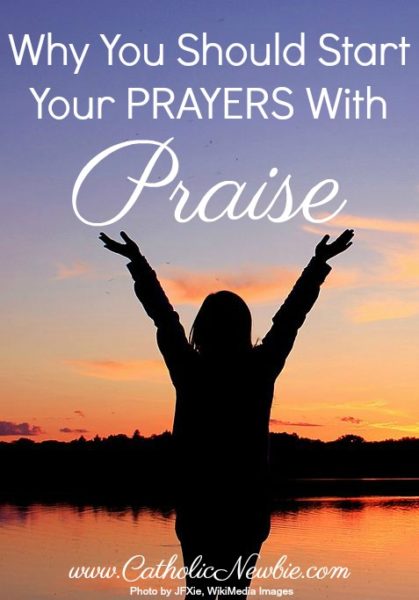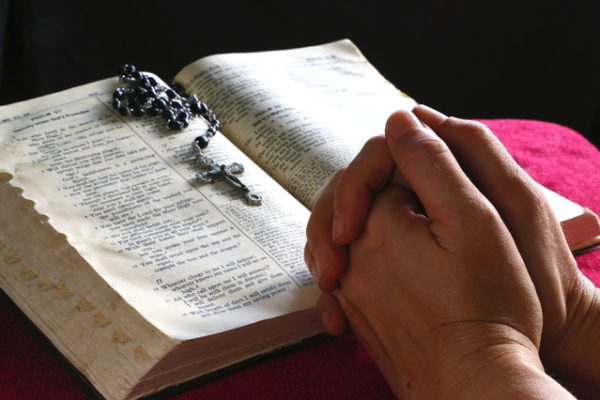Praise First: Why You Should Start Your Daily Prayers With Praise

Did you know you should start your prayer with praise to God? This was news to me after a friend shared this insight during a recent RCIA class in which I was assisting. But it makes sense, doesn’t it? Shouldn’t we acknowledge who God is and thus who we are in relation before we start rattling off our list of requests in our daily prayers?
Where does this idea come from? Let me share what I’ve learned, because it has already made a huge difference in my prayer, and thus, my life.
Please note this post contains some affiliate links to books for which I may earn a small commission — at no cost to you — to support A Catholic Newbie if you make a purchase after clicking through. I really appreciate you using my links!
The Lord’s Prayer
The Lord’s Prayer is how Jesus taught us to pray. It is the “perfect” prayer. And while we should definitely pray it word for word, it also offers us a model of HOW to pray. Guess what the Lord’s Prayer starts with? You got it: praise!
“Our Father, who art in Heaven, HALLOWED be they name. Thy Kingdom come, thy will be done on earth as it is in heaven.”
THEN… we get to our petitions, as well as asking forgiveness for our sins.
The Praise Perspective
Putting praise first puts us in proper perspective in relation to God. God is God; we are not. In fact, the original sin of Adam and Eve and even the people at the tower of Babel was the desire to be like God.
Let’s recall how great is our Creator and recount the amazing deeds he has performed from building Creation from nothing and leading the people out of slavery in Egypt to raising up great kings like David and, of course, sending his only Son, Jesus Christ, to save us. Makes you feel small and humbled, doesn’t it?
And that’s the position we should place ourselves before petitioning God. As Mary says in the Magnificat, “He has cast down the mighty from their thrones and lifted up the lowly.” Let us find our lowliness before God. After all, this is why we kneel and prostrate ourselves before Him, as well.
Plus, doesn’t praise put you in an attitude of gratitude, as well? It helps you turn a negative countenance around into appreciating what you have and realizing the insignificance of your problems in comparison with God and his might. It might even help you find the good in your suffering — even if it’s just knowing there IS good even if you can’t see it.
As I have incorporated praise into my prayers, I have enjoyed recounting all the things God has done in my life. Too often, I forget these and don’t call them to mind. While anytime is a good time to praise God for his works in your life, it is especially helpful when you are facing difficulty. Just remembering that God has worked miracles in your life before increases your trust, faith and dependence on Him.
The Difference Between Praise and Thanksgiving
As soon as I learned about the practice of “praise first,” I asked, “Wait, how is that different than giving thanks?” Well, the two are very closely related, but you may consider giving thanks AFTER praising God.
In Jeff Cavin’s book, “Praise God and Thank Him: Biblical Keys for a Joyful Life,” he says that praise is focusing on God and his attributes, while thanksgiving is focusing on the “works” of God. So praise might be focusing on God’s power, magnificence, holiness, justice, love, mercy and might, while thanksgiving might be more aligned to thanking God for the good things you have in your life and even the difficult situations you are facing, knowing that they are part of His plan.
Putting It Into Practice

So how exactly do you praise God? It sounds simple, but if you’ve never done it, it can certainly feel awkward :).
At first, it may be easiest to start by reading a Bible verse that is praising God to give you the feel for what proper praise should be. You might also bring to mind different parts of the Mass — which is FULL of praise if you listen — that you can pray, like the Gloria, the “Holy, Holy, Holy” and, of course, the Psalms. Eventually, you will be able to form your own words of praise with a little practice.
Here are some ideas to get you started:
- The Psalms were written as praises to God; start by reading a Psalm and then interpret it afterward in your own way as praise to God.
- Praise Jesus in his many titles: King of Kings, The Christ, Holy One of God, Savior of the World, Divine Mercy, etc.
- Praise God for what he has done for his people over all time: Creating Adam and Eve; forgiving us; raising up prophets, judges and kings to guide us; sending his only Son to save us; leading the people out of slavery in Egypt; leading the Israelites out of exile again and again. If you don’t know much about the Old Testament, now might be a great time to learn! I highly recommend “Bible Basics for Catholics” and “New Testament Basics for Catholics” both by John Bergsma as unintimidating and easy reads about the Bible. Read my post on why I think every Catholic should read “New Testament Basics for Catholics.”
- Pray a “rosary of gratitude” (give praise for something on each bead of the rosary; read more in Patti Armstrong’s article on “The Power of Gratitude to Transform Suffering“)
- Praise God for Creation and the beauty of nature you see around you — or have seen when traveling.
- Praise Him for his many great saints who he has raised up to show us how to live as holy human beings.
- Praise Him for the Trinity, the Holy Spirit and Jesus.
- Praise Him for the Bible.
- Praise Him for His Church.
- Praise Him for his Mother Mary.
- Praise Him for our difficult situations and the graces they will bring.
- Pray the Magnificat; it is a wonderful prayer of joyous praise to God as spoken by Mary, the Mother of God.
- Pray Hannah’s prayer (1 Samuel: 2).
- Sing the Gloria!
What Should We Do After Praise?
So you’ve praised God — good for you! Now, you are ready to progress through the rest of your daily prayers. What I like to do next is spend time thanking God for all the good things he has done in my life and for the bad, as well.
According to Michael Scanlan, T.O.R., in his booklet, “Appointment With God,” after praise, we should spend time in the Bible reading the Word of God. Perhaps you can read the Catholic Church’s Daily Readings, read a Psalm or follow a Bible reading plan. But whatever you do, read the passage several times and pray to God to ask what He wants you to understand from the reading. Sit with it for a bit. Put yourself in the scene, imagine your reaction, pay attention to the words and phrases that stand out to you and ask how they relate to your life.
Next, he says to spend some time in repentance. Lay out for God what you have done wrong and what you could have done better. Ask for help in the areas where you are struggling. Of course, going to Reconciliation regularly, as well, should be a part of your prayer life.
Then, it’s time to get to your petitions, but Scanlan recommends praying for others first, especially those whom you are having trouble forgiving. He suggests praying: “Holy Father, may you pour out your Holy Spirit out upon [NAME]. Please make them as holy and happy as possible even if they are holier and happier than I am.” Then, you can get to your requests. But, again, sit in quiet for a bit to see if God plants an idea in your mind or speaks to you in some way.
Finally, if you’ve determined an action or two God wants you to take, make haste like Mary when she headed to the hill country to her cousin Elizabeth after the Angel Gabriel spoke to her. Don’t waste time. Get to it, my friend!
Making Time for Praise in Your Daily Prayers
According to Scanlan, we need to “book” a time with God to pray every day. We all know that, don’t we? But we don’t really do it. Do you want to be more at peace? Do you want to see the power of God working in your life? Do you want God to guide you? Then put God on your calendar FIRST. I know you can do it!
I recently incorporated a daily morning walk into my routine to improve my health and decided this was an ideal time to praise God. I now call it my “praise walk” :). As often as I can, I attend daily mass and have decided to spend 10-15 minutes in our Blessed Sacrament Chapel in the presence of Jesus in prayer. I often pray for others first (ask God WHO you should pray for and HOW you should pray for them; he’ll tell you if you listen!), then lay before God a question on my heart and listen for the answer.
Then at different times throughout the day, such as when taking the dog for a walk or in the shower, I try to pray the rosary along with several other prayers that are important to see. Read my post on “11 Ways to Work the Rosary Into Your Busy Day.”
Praising God is truly what we were designed to do. He made Man on the sixth day of Creation, always pointing toward the Sabbath — and the worship and praise of God — on the seventh day. If we but fall in line with our Creator’s design for us, we can live an infinitely more fulfilling life by growing closer to God and becoming better equipped to become the saints he desires for us to be.
Do you put praise first in your prayer? How has it impacted your prayer life?
Learn More:
- “Praise God and Thank Him: Biblical Keys for a Joyful Life” by Jeff Cavins
- “Elizabeth of the Trinity: A Life of Praise to God” by Sr. Giovanna Della Croce, O.C.D.
- “Appointment with God” by Michael Scanlan, T.O.R.
- “Bible Basics for Catholics” by John Bergsma
- “New Testament Basics for Catholics” by John Bergsma (goes into the New Testament more in depth and shows how the Old Testament prefigures the New)
Read More:




Thanks, Lyn, for this powerful message to praise God. I know it’s something that I do not make important enough. When many of us think of praying, we think of asking for things. Your article is an eye-opener and full of inspiration.
Thanks so much Patti!
Thanks so much for reawakening me. I used to practice praise in the past and my prayer life had changed. I will rekindle!
Awesome. Yea!! 🙂
[…] making your petition, it’s always a good idea to start your prayer in praise and thanksgiving. Then, make your prayer to God, and as the Surrender Novena says, say “Jesus, […]